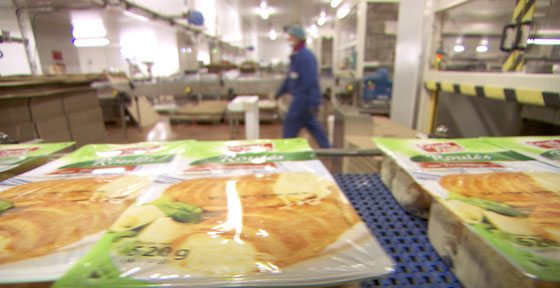Contributing writer Al Bredenberg of Design News recently interviewed Deepak Vetal, product marketing manager at Atlas Copco, to discuss the benefits of oil-free air compressors for both the food and packaging automation industries, as well as the new ISO 22000 Certification. The following is an excerpt from the article, Don’t Overlook Compressed Air in Food and Packaging Automation Either.
Last week, a major equipment supplier to machinery OEMs told us not to overlook the hydraulics in factory automation. This time, another supplier reminds us not to forget the compressed air — notably in food-making and packaging machinery.
Keeping food on the tables of Earth’s billions means preventing contamination of food processing systems via its many forms and vectors, and a recent presentation at the Pack Expo trade event in Las Vegas emphasized one contamination source in particular: compressed air.
Compressed air is often identified as the “fourth utility,” alongside electricity, water, and gas, powering many kinds of industrial systems, including those for food production and packaging.
At Pack Expo, Deepak Vetal, product marketing manager for oil-free compressors at Atlas Copco, discussed food safety, compressed air, and the value of the ISO 22000 standard for food safety management systems.
Vetal emphasized to his Pack Expo audience that compressed air is used by 90% of food and beverage processing companies and is a safe and reliable power source for powering instruments, actuators, and conveyors; pressurizing; tank aeration; sorting; and other functions.
In oil compressors, the fluid is used for cooling, sealing, and lubrication of machine components. That oil can be introduced into the compressed air, and thus can potentially come in contact with food during production and processing. A compressor or any other piece of equipment could also carry physical hazards and contamination generated during its manufacture, thus conveying a threat into the food supply chain.
Compressed air might contact food directly, Vetal told the Pack Expo audience, or such contact could be more indirect, as when “compressed air is exhausted into the local atmosphere during food preparation, production, processing, packaging, or storage.”
In his conversation with Design News, Vetal admitted that for an oil-free compressor “you’re going to pay a premium up front,” compared to an oil-lubricated model, “even two-and-a-half times as much in some cases.” However, he added, “You need to look at the whole system and the life-cycle cost.”
Interested in learning more?
You can continue reading the article here: Don’t Overlook Compressed Air in Food and Packaging Automation Either. If you’d like to speak to an Atlas Copco representative, fill out our Request a Quote form and someone will be in touch with you shortly. You may also be interested in the following articles:
- How to Save 3,500 kWh Annually and Reduce Total Cost of Ownership
- Food Manufacturing Q&A on ISO 22000 Certification
- How to Design an Efficient Compressed Air Distribution Network
Source: Compressed Air Blog


